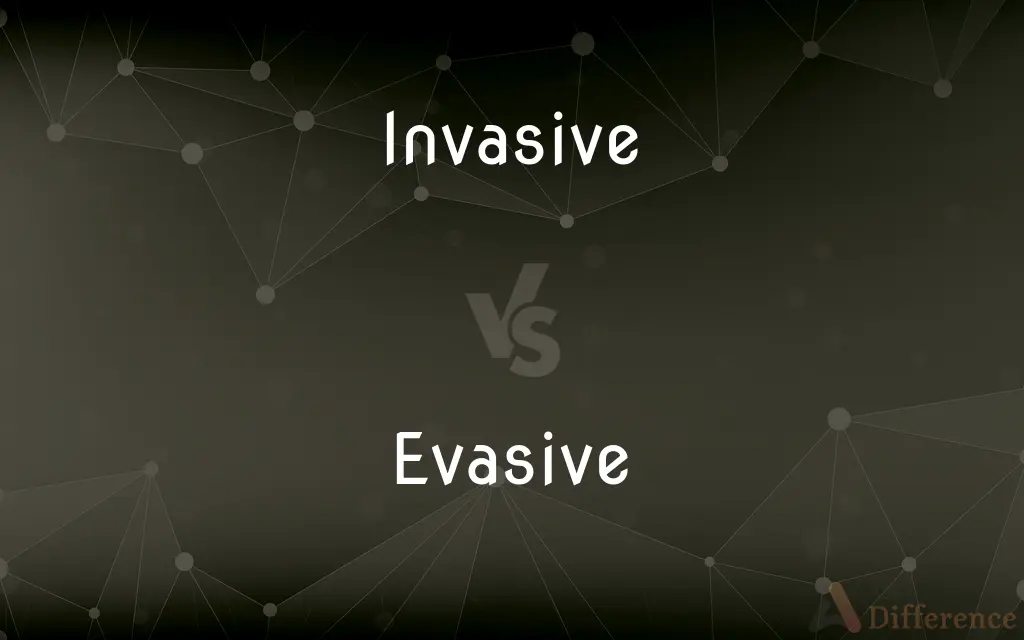Invasive vs. Evasive — What's the Difference?
By Tayyaba Rehman — Updated on November 6, 2023
Invasive pertains to an aggressive and often harmful spread, while evasive describes a tendency to avoid directness or to evade a clear response.

Difference Between Invasive and Evasive
Table of Contents
ADVERTISEMENT
Key Differences
"Invasive" refers to an approach or action characterized by intrusion into a system or area where it is not wanted, often causing harm or disruption. In biology, it describes a species that enters a new ecosystem and spreads, usually to the detriment of native species and environments. "Evasive," in contrast, describes a method of avoiding something, often by deflecting attention or giving indirect answers in communication. It suggests a desire to avoid confrontation or to escape detection or comprehension.
An invasive procedure, for instance, is one that enters the body, like surgery, and is often unwelcome but necessary for health. An evasive maneuver, however, might be a tactic used by a pilot to avoid an enemy aircraft. While invasive actions are often aggressive or forceful, evasive actions are characterized by strategic avoidance.
In the context of personal behavior, someone who is invasive may overstep boundaries, asking questions or entering spaces that are not open to them. Evasive behavior, however, would involve dodging questions or avoiding the sharing of personal information. The invasive person pushes in, while the evasive person pulls back.
In a metaphorical sense, invasive can also describe something that is pervasive and unwelcome, like invasive thoughts. Evasive, similarly, might describe a line of reasoning that is deliberately obscure or misleading, dodging the central point. Both terms carry a sense of action and reaction, but one advances while the other retreats.
Comparison Chart
Definition
Tending to intrude
Tending to avoid
ADVERTISEMENT
Connotation
Often negative, unwanted
Often implying avoidance
Usage
Describes actions, species, or diseases
Describes behavior or tactics
Nature
Aggressive, direct
Defensive, indirect
Common Contexts
Medicine, ecology
Communication, strategy
Compare with Definitions
Invasive
Involving entry into the living body, as by incision.
The doctor decided that invasive surgery was necessary.
Evasive
Tending to avoid commitment or self-revelation.
She was evasive when asked about her past work experience.
Invasive
Tending to spread very quickly and undesirably or harmfully.
Invasive advertising tactics dominated the cityscape.
Evasive
Aimed at evading, dodging, or escaping.
He made an evasive maneuver to avoid the tackle.
Invasive
Marked by a tendency to spread, especially into healthy tissue.
Invasive cancer cells can be challenging to treat.
Evasive
Elusive or hard to catch.
The suspect was evasive, constantly changing his whereabouts.
Invasive
Infringing on the rights of others; intrusive.
His invasive questions made her uncomfortable.
Evasive
Avoiding the point; not straightforward.
Her evasive speech left the audience confused.
Invasive
Tending to spread very quickly and undesirably or harmfully
Patients suffering from invasive cancer
Evasive
Deliberately vague or ambiguous.
His evasive answers frustrated the interviewers.
Invasive
Of, engaging in, or given to armed aggression
An invasive military force.
Evasive
Tending to avoid commitment or self-revelation, especially by responding only indirectly
She was evasive about her phone number
Invasive
Of or relating to a disease or condition that has a tendency to spread, especially into healthy tissue
An invasive carcinoma.
Evasive
Inclined or intended to evade
Took evasive action.
Invasive
Of or relating to a medical procedure in which a part of the body is entered, as by puncture or incision.
Evasive
Intentionally vague or ambiguous; equivocal
An evasive statement.
Invasive
Tending to spread widely in a habitat or ecosystem. Used especially of nonnative species
An invasive grass.
Evasive
Tending to avoid speaking openly or making revelations about oneself.
Invasive
Tending to intrude or encroach, as upon privacy.
Evasive
Directed towards avoidance or escape; evasive action.
Invasive
An invasive species or organism.
Evasive
Tending to evade, or marked by evasion; elusive; shuffling; avoiding by artifice.
Thus he, though conscious of the ethereal guest,Answered evasive of the sly request.
Stammered out a few evasive phrases.
Invasive
Of or pertaining to invasion; offensive.
Evasive
Deliberately vague or ambiguous;
His answers were brief, constrained and evasive
An evasive statement
Invasive
That invades a foreign country using military force; also, militarily aggressive.
Evasive
Avoiding or escaping from difficulty or danger especially enemy fire;
Pilots are taught to take evasive action
Invasive
(by extension)
Evasive
Skillful at eluding capture;
A cabal of conspirators, each more elusive than the archterrorist
Invasive
Intrusive on one's privacy, rights, sphere of activity, etc.
Invasive
Originating externally.
Invasive
(biology) Of an animal or plant: that grows (especially uncontrollably) in environments which do not harbour natural enemies, often to the detriment of native species or of food or garden flora and fauna.
An invasive species
Invasive
Of a procedure: involving the entry of an instrument into part of the body.
Invasive
(pathology) Of a carcinoma or other abnormal growth: that invades healthy tissue, especially rapidly.
Invasive
(biology) An invasive organism, such as an animal or plant.
Invasive
Tending to invade; characterized by invasion; aggressive.
Invasive
Tending to spread, especially tending to intrude into healthy tissue; - used mostly of tumors.
Invasive
Relating to a technique in which the body is entered by puncture or incision
Invasive
Marked by a tendency to spread especially into healthy tissue;
Invasive cancer cells
Invasive
Involving invasion or aggressive attack;
Invasive war
Invasive
Gradually intrusive without right or permission;
We moved back from the encroaching tide
Invasive tourists
Trespassing hunters
Invasive
Relating to an unwelcome intrusion.
The invasive species overtook the native plant life.
Common Curiosities
Can a medical procedure be both invasive and evasive?
Medically, a procedure is termed invasive if it involves entering the body; it’s not used with the term evasive.
Why are invasive species a problem?
Invasive species can disrupt ecosystems, harm native species, and cause economic damage.
How can a plant be invasive?
A plant is invasive if it spreads aggressively and outcompetes native species.
What does invasive mean?
Invasive typically refers to something that intrudes and spreads harmfully.
How can someone be evasive in answering questions?
By giving vague, non-committal, or roundabout answers instead of direct responses.
Is being evasive always negative?
It can be seen as negative, especially if transparency is expected, but it can also be a defense mechanism.
Can one be subtly evasive?
Yes, subtle evasion is possible through careful choice of language and avoiding specifics.
Can a computer virus be invasive?
Yes, a computer virus can be invasive by spreading to different parts of the system and causing damage.
What is the difference between invasive and aggressive?
Invasive refers specifically to unwelcome intrusion, while aggressive can refer to any forceful action.
What does evasive mean in communication?
In communication, being evasive means avoiding direct answers or clear commitment.
Are evasive maneuvers safe in driving?
Evasive maneuvers are emergency actions to avoid collisions and can be safe if executed properly.
Are invasive measures always necessary in medicine?
Not always; sometimes non-invasive alternatives are available and preferred.
What are examples of invasive procedures?
Examples include surgeries, biopsies, and other procedures that require entry into the body.
How do you deal with invasive people?
Set clear boundaries and communicate them firmly.
Is evasion always deliberate?
Evasion is often deliberate, but it can sometimes occur subconsciously.
Share Your Discovery

Previous Comparison
Sublimation vs. Deposition
Next Comparison
Candy vs. ChocolateAuthor Spotlight
Written by
Tayyaba RehmanTayyaba Rehman is a distinguished writer, currently serving as a primary contributor to askdifference.com. As a researcher in semantics and etymology, Tayyaba's passion for the complexity of languages and their distinctions has found a perfect home on the platform. Tayyaba delves into the intricacies of language, distinguishing between commonly confused words and phrases, thereby providing clarity for readers worldwide.














































